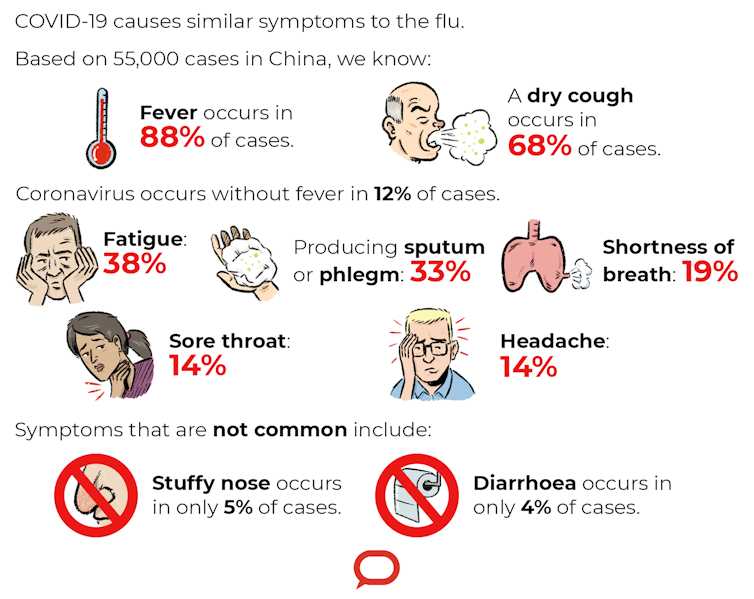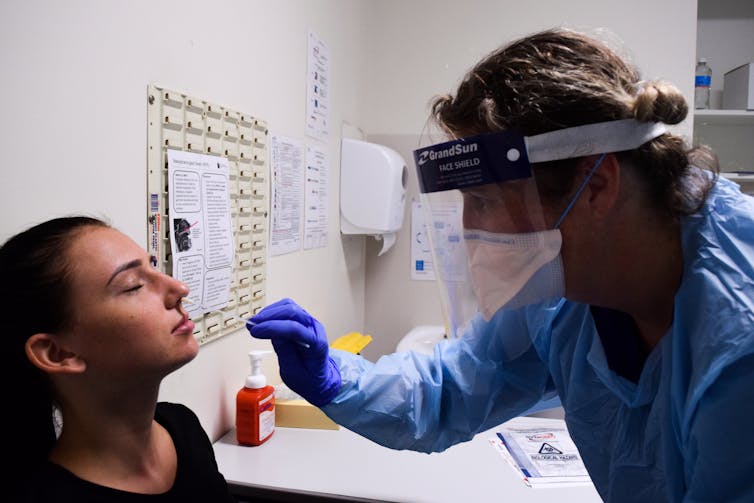Who can get tested for coronavirus?
- Written by Hassan Vally, Associate Professor, La Trobe University
To control the spread of COVID-19 we need to identify as many people with the virus as possible. If we know who has it, we can isolate them so they can’t infect others and quarantine their close contacts in case they’ve already been infected.
But some experts are concerned we’re not testing enough. Because of restrictions on who can be tested, they argue, we’re only seeing the tip of the iceberg. Beneath the surface, the virus could be spreading much more than we think.
Read more: To get on top of the coronavirus, we also need to test people without symptoms
The federal government recently expanded its testing guidelines and now allows states and territories to set their own rules for testing. But before we get to what they say, let’s look at the symptoms.
What are the symptoms of COVID-19?
Colds, influenza and COVID-19 are all respiratory illnesses and share many of the same symptoms.
For COVID-19, the most common symptoms are fever and a dry cough. Other symptoms might include fatigue, the production of phlegm, shortness of breath, a sore throat and a headache.
But some people experience no, or mild, symptoms.
 The Conversation, CC BY-ND
What is Australia’s testing criteria?
Across Australia, if you develop a respiratory illness, with or without a fever, you can be tested for coronavirus if you:
have returned from overseas in the past 14 days or spent time on a cruise ship
have been in close contact with a confirmed COVID-19 case in the past 14 days
have severe community-acquired pneumonia and there is no clear cause.
Read more:
Coronavirus: how long does it take to get sick? How infectious is it? Will you always have a fever? COVID-19 basics explained
If you have a fever or a respiratory illness, you can be tested (and in some cases, must be tested), if you:
work in health care, aged care or other residential care sectors
have spent time in a location with elevated levels of community transmission
have spent time at a “high-risk” location where there are two or more linked cases of COVID-19. This could be an aged care facility, a remote Aboriginal community, a correctional facility, a boarding school, or a military base with live-in accommodation.
Who else can get tested?
Australians in all states and territories can get tested if they meet the criteria above, but some states have expanded their criteria.
In Western Australia, if you have fever of 38℃ and over and have signs of a respiratory infection, you may be tested.
In New South Wales, GPs have discretion to test anyone who has symptoms of COVID-19. People who identify as Aboriginal in rural and remote communities may also be tested, as can people who live in communities with local transmission.
South Australia has had a cluster of cases among airport baggage handlers. Therefore, anyone who has symptoms of COVID-19 and has been at the airport in the past 14 days, including the carpark or terminal, should also present.
Queensland will offer testing for people who have symptoms consistent with COVID-19 and live in a Aboriginal or Torres Strait Islander communities, as Indigenous Australians are more vulnerable to COVID-19.
Read more:
Coronavirus will devastate Aboriginal communities if we don't act now
Victoria has introduced random testing at screening centres, testing every fifth person who presents. This should provide a snapshot of the spread of the virus among a broader section of the community.
The ACT, Northern Territory and Tasmania are following the national guidelines and haven’t included any other groups or situations in which someone can be tested.
So what if you think you have COVID-19?
If you think you have symptoms of COVID-19, call your your GP and advise them of your symptoms and other relevant details, such as travel or contact with a known case.
The Conversation, CC BY-ND
What is Australia’s testing criteria?
Across Australia, if you develop a respiratory illness, with or without a fever, you can be tested for coronavirus if you:
have returned from overseas in the past 14 days or spent time on a cruise ship
have been in close contact with a confirmed COVID-19 case in the past 14 days
have severe community-acquired pneumonia and there is no clear cause.
Read more:
Coronavirus: how long does it take to get sick? How infectious is it? Will you always have a fever? COVID-19 basics explained
If you have a fever or a respiratory illness, you can be tested (and in some cases, must be tested), if you:
work in health care, aged care or other residential care sectors
have spent time in a location with elevated levels of community transmission
have spent time at a “high-risk” location where there are two or more linked cases of COVID-19. This could be an aged care facility, a remote Aboriginal community, a correctional facility, a boarding school, or a military base with live-in accommodation.
Who else can get tested?
Australians in all states and territories can get tested if they meet the criteria above, but some states have expanded their criteria.
In Western Australia, if you have fever of 38℃ and over and have signs of a respiratory infection, you may be tested.
In New South Wales, GPs have discretion to test anyone who has symptoms of COVID-19. People who identify as Aboriginal in rural and remote communities may also be tested, as can people who live in communities with local transmission.
South Australia has had a cluster of cases among airport baggage handlers. Therefore, anyone who has symptoms of COVID-19 and has been at the airport in the past 14 days, including the carpark or terminal, should also present.
Queensland will offer testing for people who have symptoms consistent with COVID-19 and live in a Aboriginal or Torres Strait Islander communities, as Indigenous Australians are more vulnerable to COVID-19.
Read more:
Coronavirus will devastate Aboriginal communities if we don't act now
Victoria has introduced random testing at screening centres, testing every fifth person who presents. This should provide a snapshot of the spread of the virus among a broader section of the community.
The ACT, Northern Territory and Tasmania are following the national guidelines and haven’t included any other groups or situations in which someone can be tested.
So what if you think you have COVID-19?
If you think you have symptoms of COVID-19, call your your GP and advise them of your symptoms and other relevant details, such as travel or contact with a known case.
 First, call your GP or the coronavirus helpline.
St Vincent's Hospital
If you don’t have a usual GP or want to discuss your concerns, call the National Coronavirus Helpline on 1800 020 080. You will be given information on where the closest COVID-19 testing clinic is and detailed advice on whether you should be tested.
If you’re asked to come to a COVID-19 clinic, you’ll need to take precautions. These include driving yourself if possible, wearing a mask if you have one, staying at least 1.5 metres from other people and coughing or sneezing into your elbow.
First, call your GP or the coronavirus helpline.
St Vincent's Hospital
If you don’t have a usual GP or want to discuss your concerns, call the National Coronavirus Helpline on 1800 020 080. You will be given information on where the closest COVID-19 testing clinic is and detailed advice on whether you should be tested.
If you’re asked to come to a COVID-19 clinic, you’ll need to take precautions. These include driving yourself if possible, wearing a mask if you have one, staying at least 1.5 metres from other people and coughing or sneezing into your elbow.
Authors: Hassan Vally, Associate Professor, La Trobe University
Read more https://theconversation.com/who-can-get-tested-for-coronavirus-135422





